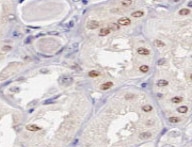Human Amphiphysin/AMPH Antibody Summary
Asn204-Gly300
Accession # P49418
Applications
Please Note: Optimal dilutions should be determined by each laboratory for each application. General Protocols are available in the Technical Information section on our website.
Scientific Data
 View Larger
View Larger
Amphiphysin/AMPH in Human Brain. Amphiphysin/AMPH was detected in immersion fixed paraffin-embedded sections of human brain (cortex) using Mouse Anti-Human Amphiphysin/AMPH Monoclonal Antibody (Catalog # MAB6527) at 15 µg/mL overnight at 4 °C. Before incubation with the primary antibody, tissue was subjected to heat-induced epitope retrieval using Antigen Retrieval Reagent-Basic (Catalog # CTS013). Tissue was stained using the Anti-Mouse HRP-DAB Cell & Tissue Staining Kit (brown; Catalog # CTS002) and counterstained with hematoxylin (blue). Specific staining was localized to neuronal cell bodies. View our protocol for Chromogenic IHC Staining of Paraffin-embedded Tissue Sections.
Reconstitution Calculator
Preparation and Storage
- 12 months from date of receipt, -20 to -70 °C as supplied.
- 1 month, 2 to 8 °C under sterile conditions after reconstitution.
- 6 months, -20 to -70 °C under sterile conditions after reconstitution.
Background: Amphiphysin/AMPH
AMPH (Amphiphysin; also AMPH1) is a member of the Amphiphysin family, BAR superfamily of proteins. Although its calculated MW is only 78 kDa, it runs anomalously in SDS-Page at 125-128 kDa. It is expressed in neurons, Sertoli cells, possibly in anterior pituitary endocrine cells and apparently cardiac muscle. It appears to form heterodimers with AMPH2, and in this configuration, promotes clathrin-associated endocytic vesicle formation. Furthermore, and perhaps related, AMPH also interacts with N-WASP, initiating actin polymerization. Human AMPH is 695 amino acids (aa) in length. It contains an N-terminal BAR domain (aa 24-240) that binds lipids, a central region that binds AP2 (aa 322-340) and clathrin (aa 347-386), and a C-terminal SH3 domain (aa 622-695) that binds proline-rich ligands. There is one known 108 kDa splice variant that shows a deletion of aa 425-466. Over aa 204-300, human AMPH shares 98% aa identity with mouse AMPH.
Product Datasheets
FAQs
No product specific FAQs exist for this product, however you may
View all Antibody FAQsReviews for Human Amphiphysin/AMPH Antibody
Average Rating: 5 (Based on 1 Review)
Have you used Human Amphiphysin/AMPH Antibody?
Submit a review and receive an Amazon gift card.
$25/€18/£15/$25CAN/¥75 Yuan/¥2500 Yen for a review with an image
$10/€7/£6/$10 CAD/¥70 Yuan/¥1110 Yen for a review without an image
Filter by:

